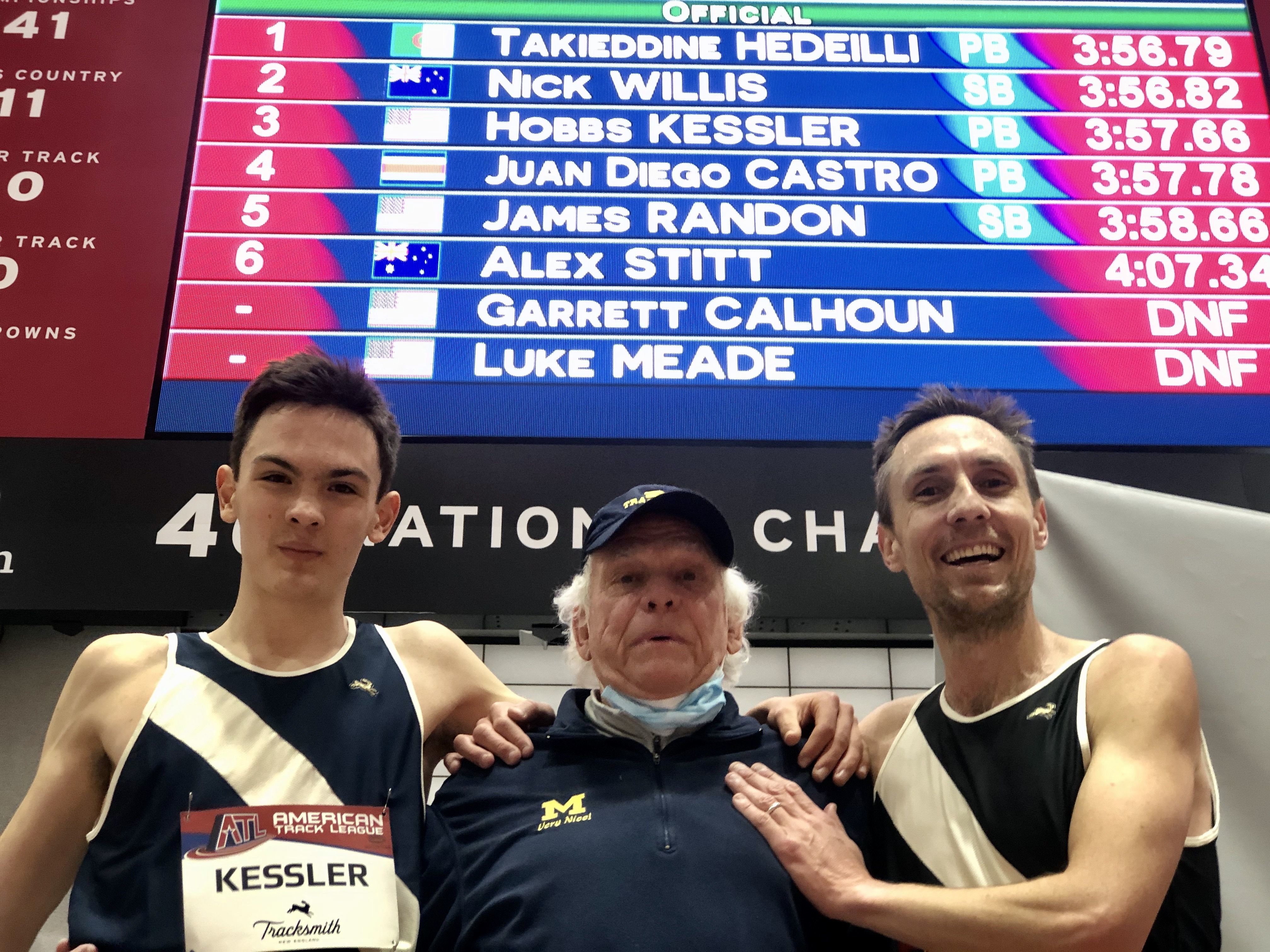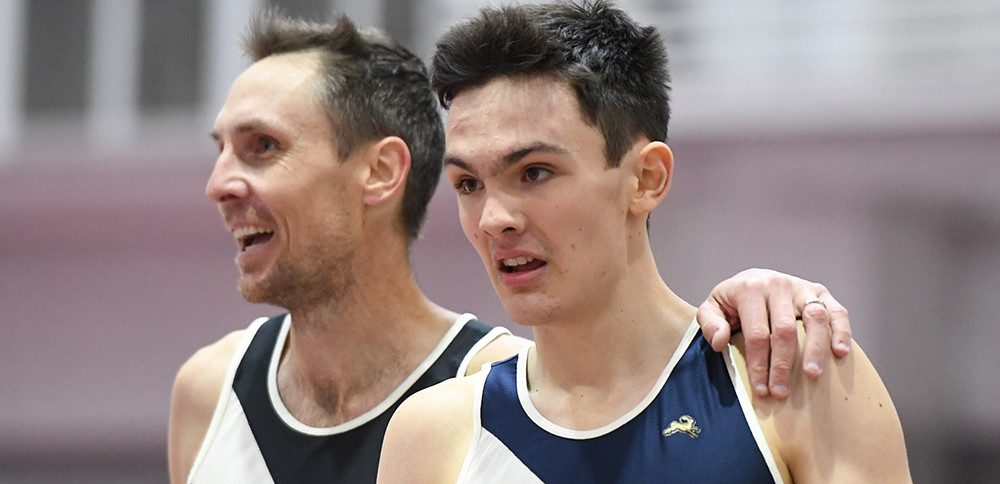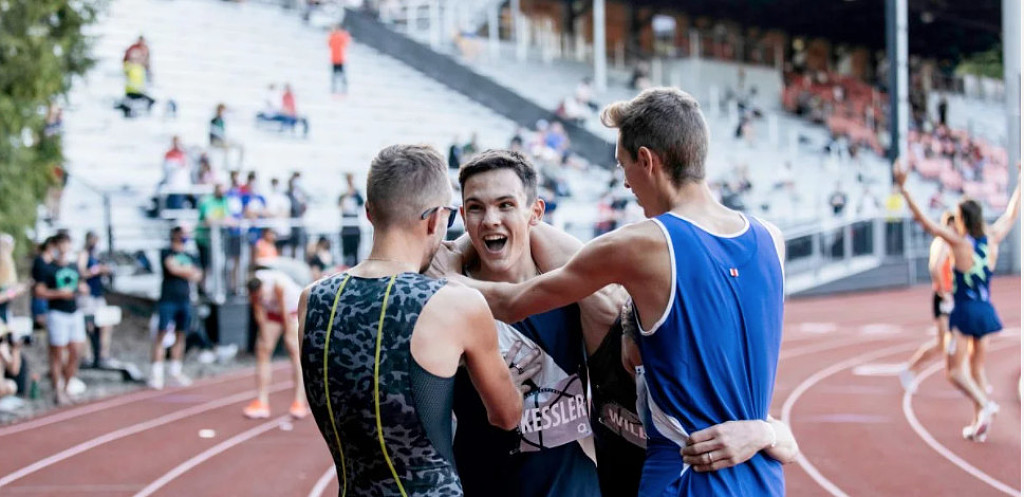Running News Daily
Running News Daily is edited by Bob Anderson. Send your news items to bob@mybestruns.com Advertising opportunities available. Train the Kenyan Way at KATA Kenya and Portugal owned and operated by Bob Anderson. Be sure to catch our movie A Long Run the movie KATA Running Camps and KATA Potato Farms - 31 now open in Kenya! https://kata.ke/
Index to Daily Posts · Sign Up For Updates · Run The World Feed
Introducing the Country’s Fastest High Schooler
Hobbs Kessler is taking the running world by storm
Last February, Hobbs Kessler, a 17-year-old senior from Michigan who has committed to run for the University of Northern Arizona next fall, set a new high school record for the indoor mile. His time of 3:57.66 made him only the twelfth American high schooler to break the four-minute barrier since Jim Ryun first did it in 1964. The feat was all the more notable considering that Kessler’s mile PB coming into the race was a comparatively modest 4:08.4, which he ran last summer. As Track and Field News noted, Kessler’s record had come “seemingly out of nowhere.”

One explanation for Kessler’s sudden arrival into the upper ranks of American middle-distance running is that the pandemic has caused a number of rising stars to train in relative obscurity, with far fewer official meets to document the gradual progression of their talent. (Apparently, Kessler’s 4:08 mile last year was set in a time trial.) No wonder, then, that after his record-breaking run in February, the narrative around Kessler quickly morphed from Who is this guy? to What else is he capable of?
At last weekend’s Portland Track Festival, we found out. In the men’s 1,500-meters, Kessler, now 18, ran 3:34.36 to break Alan Webb’s 20-year-old high school record in the “metric mile” by almost four seconds—an eternity in such a short race. What’s more, Kessler’s time was also quicker than the men’s collegiate 1,500-meter record (3:34.68) and faster than the current Olympic standard (3:35.00). The guy few people had heard of six months ago was suddenly on the shortlist for the greatest U.S. high school runner, ever.

Until recently, track and field wasn’t even Kessler’s primary focus. In 2019, he represented the United States at the IFSC Climbing World Youth Championships. I caught up with Kessler to chat about the miraculous evolution of his young running career, choosing track over climbing, and his plans for the future.
OUTSIDE: Last summer, you cracked 4:10 in the mile for the first time. Less than a year later, you’ve run a 1,500 that converts to a 3:51. Are you shocked by how quickly you’ve progressed in such a short time? Can you still savor the moment?
KESSLER: In early 2020, I just wanted to run 4:13, indoors, in the mile. And then it kind of snowballed from there. I’ve gotten used to shifting my mindset on how I view myself as a runner. As I keep upping it, I always think, “OK, this is the last time,” but it hasn’t been so far. So, it’s been a little crazy in that regard, but I’m really enjoying it. I feel like I’ve been able to adapt my mindset really quickly—a lot faster than my folks. I think they’re still stuck six months back, which is pretty funny.
By “shift in mindset,” I’m guessing you mean a shift in expectations that you have for yourself. Are you worried that you might not be able to live up to your own standards, considering how quickly you’ve progressed?
I guess it can be a double-edged sword. In the winter, before I broke four for the first time, the 60-second-per-lap pace was everything, so that’s what we did all our workouts at. Now that I’m more fit, 57 is the new 60. But it’s all about not viewing it as fast. Because if I thought of 4:10 as fast, then I’d probably be running 4:10. So, you can control some of it with your mind. As far as not living up to expectations, I know that at some point I’m going to take a hit and not be running as well. But this season, I’ve been taking everything in stride and good things have been happening. I’ve never worried that I wasn’t going to run well.
There’s a theory that the bizarre circumstances of the pandemic might have helped some athletes nurture their talent by clearing their racing schedule. Is there any sense in which the events of last year changed your approach to training and racing?
As far as training goes, I would say the pandemic allowed me to just take a block from March 2020 to August to just get stronger. When the season got shut down, my dad switched me over to doing tempos on Tuesdays and hills on Fridays. But I was doing a lot of really fast strides because I wanted to develop my speed. Trying to work on my form. I’m a fairly fresh runner and haven’t been at it that long, so my running form is still very malleable. I didn’t have a race to worry about, so I just ran two big workouts a week and a big long run. I think people are realizing that racing less and training more can yield faster times. I’ve probably only gone all-out five times this year—but when I do decide to go all-out, I put a lot of emphasis on not wasting the opportunity.
I know that you are coached by your father, but also by Ron Warhurst—a legend in the coaching world, who is credited with “inventing” one of the sport’s most famous workouts. Do you have a favorite session that you like to do—perhaps something from Warhurst’s catalog of torture?
Both Ron and my dad have a lot of input in my training, but I’m more on Ron’s program now. I would say that my favorite workout of Ron’s has to be “Michigan,” because it’s his signature thing and you hit pretty much every pace and it can also be adjusted to wherever you’re at.
You’ve qualified for the Olympic Trials in the 1,500 as a high schooler. That’s nuts. But you’re also in a good spot in which there’s no pressure and where, presumably, you can just go and enjoy the experience. How do you plan to approach the Trials and do you have any other running goals for the summer?
After I broke four minutes in the mile, getting to the Trials was really the big goal. So I’m very excited about that race. Originally, I was just viewing it as a great experience where I could learn a lot so that, in three years, I might be in a position to compete for a spot on the team. But now that I’m one of the few people with the Olympic standard, my mindset has changed a bit. My thinking is that, if I’m there, I might as well have a run at the team. It’s a win-win because if I make the Olympic team that would be awesome, but if I don’t, I’m only 18 and will have a lot more attempts at it. I feel like I’m in a very cool spot where there’s no pressure, but I might as well give it a go.
You have an impressive climbing background, but it seems like you’ve decided to prioritize running for now. Was that decision based primarily on the fact that running is where you have the most talent, or was it something else?
I’m definitely prioritizing running, but I wouldn’t say it’s a conscious decision. That’s just the sport that I’ve drifted more towards in the past year or two and it’s what I’m more excited about. It’s not that I decided that I could be more successful at it, so much as that I’ve drifted towards it throughout high school.
Do you feel like the two sports complement each other in some way?
I think climbing really helps running, but running doesn’t really help climbing.
How so?
Well, the big carryover from both—and this does go either way—is that the mental stuff is the same. Race nerves in running and redpoint jitters in climbing. So there it’s the same stuff. In competitive climbing, I had to develop skills to deal with it, which translated directly to my running. But I think running destroys my coordination a little bit for climbing, so it’s hard to do both at the same time. I tried to be really good at both at the same time, but it just wasn’t possible because they started fighting each other a little bit. So I decided to let go of trying to be really good at climbing and to just do it because I enjoy the act of it.
You’ve now run a time that is faster than the NCAA 1,500-meter record. Unsurprisingly, this has fueled speculation that you might decide to go pro and skip college-level racing altogether. Do you think that early success can obscure the fact that running talent still needs to develop gradually?
When I was talking to colleges that was one of the biggest criteria I had. I wanted to make sure they developed me and weren’t just trying to get as much out of me while I was in school. So I’ve kind of had that view. Running aside, if I were to go pro, it would have to create a situation that would be worth missing out on the experience of being in college and being on a team. And I really want that experience. I’m not ready to be done being on a cross-country team. So going pro would have to outweigh that by a significant amount. Everything seems really immediate and important right now, but I have confidence it will even out. Whatever decision I make, I have confidence in the people who have been guiding me so far.
by Outside Online
Login to leave a comment




